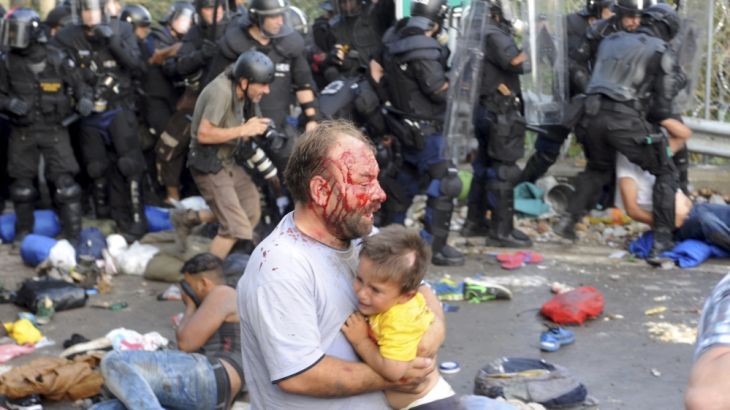Croatia to block refugees from entering Slovenia
Interior minister says refugees will have to seek asylum in Croatia as thousands stream in from Serbia.

Croatia will not allow refugees to proceed northwards to Slovenia on their way to Germany, the country’s interior minister has said, as thousands of people streamed into the country from Serbia.
Ranko Ostojic said on Thursday that the refugees entering the town of Tovarnik from Serbia would have to seek asylum in Croatia after the authorities provided safe passage to reception centres around the capital Zagreb.
Keep reading
list of 4 itemsPalestinian Prisoner’s Day: How many are still in Israeli detention?
‘Mama we’re dying’: Only able to hear her kids in Gaza in their final days
Europe pledges to boost aid to Sudan on unwelcome war anniversary
Ostojic also said that more than 9,000 refugees entered the country from Serbia in the past 24 hours.
“Croatia will close its border with Serbia if we witness again 8,000 migrants entering the country in one day,” he said. “Croatia is not interested to be a country where the migrants will seek what they can get in other countries where they are now.”
Meanwhile, the country’s prime minister, Zoran Milanovic, said that Croatia’s resources were limited.
“We will not and cannot keep them in Croatia and no one will make us do that,” he said.
On Thursday, hundreds of refugees pushed through Croatian police lines in Tovarnik with people trampling and falling on each other amid the chaos.
More than 2,000 men, women and children were stranded at the local train station for hours in heat, waiting to board trains and buses for transport to refugee centres. But when the buses arrived, groups charged towards them, overwhelming the Croatian police who unsuccessfully tried to contain the crowd.
After the situation calmed down, groups of migrants moved on foot, with police unable to stop them.
BREAKING:
Crowd is through the police line here at #Tovarnik in #Croatia. @5_News pic.twitter.com/E5is8R68uS— Peter Lane (@peterlane5news) September 17, 2015
Hundreds of people are still entering Croatia from Serbia over a Danube river bridge in the northern town of Batina after being bused by Serbs from the Hungarian border which was recently closed off.
Croatian police seemed to be unmanned and unprepared for the sudden influx of families with children as they waited to be registered for entry.
There were some chaotic scenes at the border with women fainting and children crying as buses and vans took them to Croatian collection centres.
Some families were separated as dozens of policemen tried to establish some order. Several ambulances were treating people.
UN ‘shocked’
Meanwhile, the UN chief said on Thursday that he was “shocked” after Hungarian riot police fired tear gas and water cannon at crowds of refugees desperate to cross the border from Serbia.
When asked about the border clashes on Wednesday, Ban Ki-moon said the treatment of the refugees by the Hungarian police was “not acceptable”.
Tensions boiled over at the Horgos-Roszke crossing where hundreds of furious people tore down the wire meshing separating them from Hungarian territory, and police clashed for hours with refugees, some of whom threw stones, sticks and plastic bottles.
PHOTOS: Refugees caught between hope and harsh laws in Europe
The unrest left 14 Hungarian police officers injured, the authorities said.
Serbia lodged a formal protest with Hungary over the use of tear gas on its territory, and Nebojsa Stefanovic, its interior minister, said police reinforcements were being sent to the Serbian side of the border to help calm tensions.
“We want to leave! We want to leave to Germany!” cried one French-speaking man at a protest at the border through a megaphone.
“Open the door!” he added in English, with hundreds echoing his call.

Children separated
In the chaos, at least four children were separated from their families and apparently taken by police to a nearby border control building, according to Amnesty International, the human rights organisation, said.
“The families are desperate to be reunited with their children,” Tirana Hassan, the crisis response director, said.
“Not only have they experienced the traumatic journey to the border and the use of force by the police – they have now lost the security of being with their parents.”
Large numbers of refugees camped out by the side of the road in the Serbian village of Horgos, close to the Hungarian border overnight into Thursday.
Some have tents while others lie under blankets to keep warm. Small groups gathered around makeshift fires after a night exposed to the elements.
The road leading to the closed border, that is protected by gates and barbed wire, bore the scars of Wednesday’s clashes. Scarred clothing and plastics could be seen stuck to the tarmac close to the border.
Under its new rules, Hungary said it had determined Serbia was “safe”, and therefore it could automatically deny asylum claims at the border.